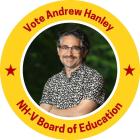The North Hunterdon-Voorhees Regional High School District is a regional, four-year public high school district, that serves students in ninth through twelfth grades from twelve municipalities in northern Hunterdon County. Students in the district are from Bethlehem Township, Califon Borough, Clinton Town, Clinton Township, Franklin Township, Glen Gardner Borough, Hampton Borough, High Bridge Borough, Lebanon Borough, Lebanon Township, Tewksbury Township, and Union Township.The district s Board of Education, comprised of 12 members, sets policy and oversees the fiscal and educational operation of the district through its administration. Board members are elected directly by voters to serve three-year terms of office on a staggered basis, with four seats up for election each year. The Board appoints a superintendent to oversee the day-to-day operation of the district. Seats on the board are allocated to the constituent municipalities and are assigned weighted votes based on population. High Bridge Borough and Lebanon Township are allocated two seats between them.
Candidate has not yet responded.
Candidate has not yet responded.
Candidate has not yet responded.
Candidate has not yet responded.
Candidate has not yet responded.
Slogan
Supporting Out Future
Involvement in Community
Lebanon Township Athletic Association Treasurer and Coach, regular attendee at School Board and Town Committee meetings
The principal responsibility of a school board is to provide oversight and set the vision for the district. That means establishing and evaluating policies, creating a strategic plan with clear goals and objectives, approving the budget, approving curriculum, and hiring and evaluating the superintendent. A strong school board keeps its focus on the big picture—the long-term health and success of the district—while leaving the day-to-day operations and management of schools to the professionals we entrust to run them. Effective governance requires discipline, and that means ensuring we’re not micromanaging, but instead providing leadership, accountability, and vision for the community we serve.
One of the most important responsibilities of a school board is hiring and evaluating the superintendent, because that individual manages the day-to-day operations of the district. When I think about the qualities that make a superintendent successful, these three stand out. First, they must be a forward-thinking leader—someone who can anticipate challenges and opportunities and guide the district with vision. Second, they need to be an effective communicator, capable of engaging not only with the board, but also with teachers, staff, parents, and students. And third, they must have the humility and adaptability to take feedback and adjust course when necessary. The NHV superintendent oversees hundreds of professionals across two campuses, and the ability to set goals collaboratively, plan strategically, and pivot when stakeholders raise valid concerns is essential to the district’s success.
Parental rights are an important part of our school system, but the way that term has been used in recently—especially in regard to library books in our district—has made it more divisive than constructive. Historically, communities were more homogenous, so there was less disagreement about what content belonged in schools. Today, our communities are more diverse, and naturally, so are opinions about what students should have access to.
I believe parents have a right to be involved in their child’s education, but that cannot mean undermining the expertise of the professionals we have hired to make curriculum and resource decisions. The phrase ‘parental choice’ has too often been co-opted as a political slogan rather than a genuine effort to collaborate. For me, the balance is clear: families should be respected and informed, but decisions about curriculum and materials must be rooted in professional judgment, educational standards, and the goal of preparing all students for the future.
What motivates me to run for the school board is simple: our district deserves effective leadership. Over the past few years, I’ve attended board meetings—sporadically at first and consistently for the last year—and it became clear that the board is too often divided, distracted by public in-fighting and political grandstanding. That discord limits its ability to focus on what matters: educating our students. At the same time, our district faces real external challenges—budget constraints and long-term enrollment shifts—that require steady, thoughtful leadership.
I believe I bring that perspective. I’m a lifelong district resident, a North Hunterdon graduate, a father of both current and former Voorhees students, a nonprofit board member, coach, former educator, and small business owner. Those experiences give me an understanding of where this district has been, where it stands today, and where it needs to go. I’m running because I want to restore civility and a focus on student success.
As someone who works in the technology field, I use AI nearly every day, and I see it as a powerful tool—much like calculators, computers, or the internet were when they first entered classrooms. If used properly, AI can help both students and teachers work more efficiently, freeing up time for deeper thinking and discussion. The key is understanding its strengths and its limitations. For example, using AI as a research tool—like you would an encyclopedia or a trade website—can be valuable, but relying on it to write an entire paper misses the purpose of the assignment.
That’s why I believe AI should be treated as another tool in the educational toolbox. The role of our schools is not to shy away from it, but to teach students how to use it responsibly and critically. Just as we teach research skills and citation, we should also be teaching AI literacy. The future will demand it, and our students should be prepared.

